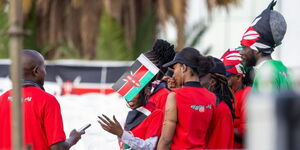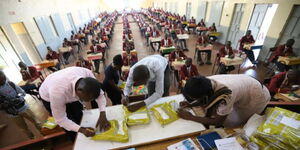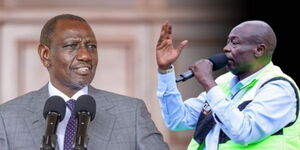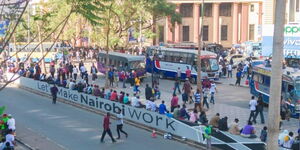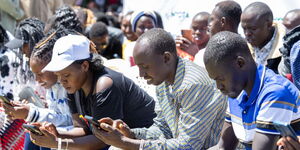President William Ruto's Kenya Kwanza administration is currently conducting the registration of Maisha Namba, a personal unique identifier.
This, according to Ruto, is meant for his government to enhance service delivery to citizens by embracing Information and Communications Technology (ICT).
Speaking in Nakuru on Saturday, September 16, Immigration and Citizen Services Principal Secretary Julius Bitok noted that the current registration and identity ecosystem is around 30 years old and has been rendered obsolete by newer technologies.
He explained the decision to upgrade the Kenyan ID system to enable it conform with global requirements and align it to a digital economy is long overdue.
"Kenya’s National Registration and Identity system currently trails behind other countries in the region, exposing it to non-compliance sanctions by international standards’ enforcement agencies.
"Digitisation of registration services will also address challenges related to identifying and authenticating Kenyan citizens. It will also promote the security of primary registration documents (birth certificates and national identity cards)," Bitok noted.
Bitok stated that a reliable and centralised identification system will also support better management of social programs, delivery of essential services and transparency and accountability in government operations.
Digital registration will further promote a reliable identification and authentication system for all citizens and potentially reduce fraud linked to identity theft. Difficult-to-forge identity will also help enhance the overall safety and security of the country.
The government has developed a number of digitised registration systems, including Maisha Namba, Maisha Card, Digital ID and National Population Master Register.
Here are the 10 frequently Asked Questions About New Digital Registration Technologies:
1. What is Maisha Namba?
Maisha Namba is a unique personal identification number assigned to every Kenyan citizen upon registration, typically at birth. This number will be a lifelong personal identity number from birth to death.
Maisha Namba will serve as the birth certificate number for newborns.
It will also serve as the registration number for government services, including enrolment to educational institutions (NEMIS) and health insurance (NHIF), and as the ID number upon reaching 18 years old.
It will also serve as a Personal Identification Number (PIN) for KRA and NSSF, among others. Upon demise, the same number will translate to the death certificate number.
2. What are the benefits of Maisha Namba?
According to PS Bitok, Maisha Namba will promote faster registration of births and acquisition of birth notification and birth
certificate and creates convenience through access to an instant digital copy of a birth certificate.
Maisha Card will also provide a single numerical identifier that can be used throughout an individual’s lifetime for government services requiring identification and establish a secure, faster and reliable identity authentication process.
"It enables the integration of personal identification information across government databases. It also eliminates multiple instances of citizen enrolment and registration," Bitok stated.
3. Will I need to register afresh as a Kenyan?
PS Bitok assured that Kenyans will not be required to register afresh. However, there are new features that have been incorporated to add value to your current identity.
The new features include a Digital Identity that will help a holder to transact digitally (online). It also has an Electronic ID with a chip – to load your data and use it for authentication and validation.
4. Will my current ID number become my Maisha Namba?
Yes, according to PS Bitok, the current ID number will be retained and referred to as your Maisha Namba. The ID number will appear on the face of the Maisha card.
5. What about Kenyans who were born before the launch of Maisha Namba and are still waiting to be 18 years of age (0-17 years)?
Bitok explained that registered Kenyans aged 0 to 17 will continue to use their birth certificates as a form of identification.
Additionally, the government will generate and assign them a Maisha Namba. Once developed, the government can access their records in the master database and retrieve their newly assigned Maisha Namba at the point of contact when the individual seeks government services.
The individual will then be able to use their assigned Maisha Namba for all services and identification.
6. Will Maisha Namba negate the need for voter registration?
No, the government has explained that the purpose of voter registration is to document eligible voters who are 18 years and above, along with their preferred constituencies.
The Maisha Namba will come in handy to ensure that voters are positively identified by linking the voter’s register to the master database.
"This linkage will eliminate the issue of deceased voters. It will also assist in cleaning the voter register, as all records of deceased individuals will automatically be flagged in the voter’s register through the linkages with the master database," PS Bitok explained.
7. How inclusive is the implementation process? Has the government considered the unique needs and circumstances of marginalised communities?
The Principal Secretary explained that Maisha Namba is being applied to the existing Civil Registration (CR) system, which
encompasses all individuals residing in the country, regardless of their citizenship or social status.
He noted that the system will incorporate a fair and relevant adjudication process for such cases.
8. What is the difference between Huduma Namba and Maisha Namba?
PS Bitok assured that the rollout of the 3rd generation ID card will not require a new mass registration of individuals. Instead, it will enhance the capacity of the current civil registration system to issue digital IDs.
"The government will, therefore, not initiate fresh registrations for individuals but will use the existing identification information held
by various government agencies to streamline and efficiently deliver services.
"Individuals will be issued a digital ID as a virtual representation of their physical identification documents. The digital ID will not solely rely on fingerprint biometry like the Huduma card but will seek to widen the pool of biometrics in the national identification system to include iris and facial recognition," Bitok explained.
He noted that the third-generation card will use cryptographic technology to store individual data in the card, an advanced and more secure technology than Huduma Namba, which contains a chip or QR code.
The third-generation ID card system will support web-based and offline identity authentication by public and private agencies. This system will, in turn, support digital signature functionality and allow holders to securely log on to e-service platforms and give legally binding digital signatures.
"The Huduma programme relied on one registration system (NIIMS) and a master database. In contrast, the proposed system will develop a master database and different registration modules for each primary registration agency to carry out their legal mandates, such as NRB will have a national digital identification module/system.
"The NIIMS programme was to print all certificates and identification cards. In the proposed system, each department will issue its documents from the master database, such as NRB will issue the digital identity," he explained.
9. Will I be prevented from accessing government services if I don’t have the Maisha Namba?
No, PS Bitok explained that citizens will not be prevented from accessing services. They can access all government services with their current National ID card.
10. What is a Maisha Card (3rd generation ID)?
This document will bear the Maisha Namba mentioned above.
It will replace the current 2nd generation ID. It will feature enhanced security details, including a microprocessor electronic chip with encrypted data that is difficult to forge or manipulate.
The card will include a photo image of the applicant, an ID number, a card serial number, biometric data, biographic data, residential particulars, and high-end security features.


